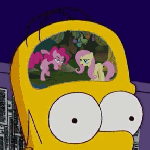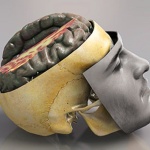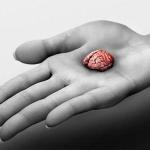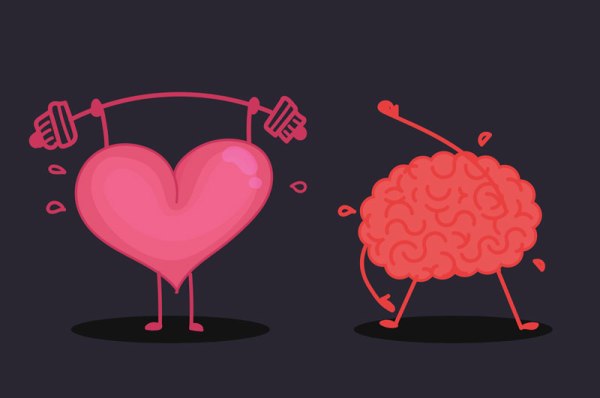Caffeine reverts memory deficits by normalizing stress responses in the brain

A new study describes the mechanism by which caffeine counteracts age-related cognitive deficits in animals. The international teams showed that the abnormal expression of a particular receptor – the adenosine A2A, target for caffeine – in the brain of rats induces an aging-like profile namely memory impairments linked to the loss of stress controlling mechanisms.
Use it or lose it: Stopping exercise decreases brain blood flow

We all know that we can quickly lose cardiovascular endurance if we stop exercising for a few weeks, but what impact does the cessation of exercise have on our brains? New research examined cerebral blood flow in healthy, physically fit older adults (ages 50-80 years) before and after a 10-day period during which they stopped all exercise.
A visual nudge can disrupt recall of what things look like

Interfering with your vision makes it harder to describe what you know about the appearance of even common objects, according to researchers. This connection between visual knowledge and visual perception challenges widely held theories that visual information about the world — that alligators are green and have long tails, for example — is stored abstractly, as a list of facts, divorced from the visual experience of seeing an alligator.
Researchers report new Zika complication

If zika didn’t seem scary enough in the media, there is new data showing that there could be a new neurological complication of infection with the Zika virus.
Next steps in understanding brain function

The most complex piece of matter in the known universe is the brain. Neuroscientists have recently taken on the challenge to understand brain function from its intricate anatomy and structure. There is no sure way to go about it, and researchers in Madrid proposed a solution to the problem.
The relationship between low physical activity and psychotic symptoms

Physical activity can help reduce cardiovascular disease and premature mortality in people with psychological problems. However, there is limited data on exercise in people with serious mental disorders, especially from low- and middle-income countries. This study explored whether complying with the World Health Organization recommendations of 150 minutes of moderate-vigorous exercise per week is related to psychotic symptoms or the diagnosis of a psychosis.
How long do you want to live? Your expectations for old age matter

Why do some people want to live a very long time, while others would prefer to die relatively young? In a latest study, a team of researchers investigated how long young and middle-aged adults in the United States say they want to live in relation to a number of personal characteristics. The results showed that more than one out of six people would prefer to die younger than age 80, before reaching average life expectancy.
Too much activity in certain areas of the brain is bad for memory and attention

Neurons in the brain interact by sending each other chemical messages, so-called neurotransmitters. Gamma-aminobutyric acid (GABA) is the most common inhibitory neurotransmitter, which is important to restrain neural activity, preventing neurons from getting too trigger-happy and from firing too much or responding to irrelevant stimuli.
Stroke-like brain damage is reduced in mice injected with omega-3s

A stroke can happen at any age, and as with anything that involves the brain, a few seconds can be life altering. Usually the rule is time lost is brain lost, but there might be some good news regarding that, researchers found that omega-3 fatty acids reduced brain damage in a neonatal mouse model of stroke.
‘I miss you so much’: How Twitter is broadening the conversation on death and mourning

Death and mourning were largely considered private matters in the 20th century, with the public remembrances common in previous eras replaced by intimate gatherings behind closed doors in funeral parlors and family homes. But social media is redefining how people grieve, and Twitter in particular — with its ephemeral mix of rapid-fire broadcast and personal expression — is widening the conversation around death and mourning.
Cloth masks offer poor protection against air pollution

Results of a new study by environmental health scientists suggest that inexpensive cloth masks worn by people who hope to reduce their exposure to air pollution vary widely in effectiveness and could be giving users a false sense of security, especially in highly polluted areas.
Neural stem cells control their own fate

To date, it has been assumed that the differentiation of stem cells depends on the environment they are embedded in. A research group now describes for the first time a mechanism by which hippocampal neural stem cells regulate their own cell fate via the protein Drosha.
Can cell phones make you feel less connected to your friends and family?


Image credit goes to: Eric Pickersgill
In this digital age, with phones at our fingertips, you would think that access to constant communication would make us feel closer to one another. But a new study shows that may not be the case. In fact, cell phone use might actually lead to feeling less socially connected, depending on your gender or cell phone habits.
A dog’s dilemma: Do canines prefer praise or food?

A new study suggests that given the choice, many dogs prefer praise from their owners over food. The study is one of the first to combine brain-imaging data with behavioral experiments to explore canine reward preferences.
Exercise can tackle symptoms of schizophrenia

Aerobic exercise can significantly help people coping with the long-term mental health condition schizophrenia, according to a new study. Through combining data from 10 independent clinical trials with a total of 385 patients with schizophrenia, Joseph Firth found that around 12 weeks of aerobic exercise training can significant improve patients’ brain functioning.
Sugar addiction: Discovery of a brain sugar switch

Researchers have discovered that our brain actively takes sugar from the blood. Prior to this, researchers around the world had assumed that this was a purely passive process. An international team reports that transportation of sugar into the brain is regulated by so-called glial cells that react to hormones such as insulin or leptin; previously it was thought that this was only possible for neurons.
Targeting the gut-brain connection can impact immunity

There’s a reason it’s called a gut feeling. The brain and the gut are connected by intricate neural networks that signal hunger and satiety, love and fear, even safety and danger. These networks employ myriad chemical signals that include dopamine, a powerful neurotransmitter most famous for its role in reward and addiction.
Is depression in parents, grandparents linked to grandchildren’s depression?

If you read my blog often, it’s no surprise I suffer from PTSD, depression, and anxiety issues. Maybe it’s from my military service, but maybe it’s my father’s, or his father’s, maybe it’s an insidious family legacy that was just never noticed. This is because having both parents and grandparents with major depressive disorder (MDD) was associated with higher risk of MDD for grandchildren, which could help identify those who may benefit from early intervention.
Want a better memory? Try eating a Mediterranean diet

It’s not a fad diet, it is an actual diet — as in the way a person eats normally — and it may do more than just help your waistline. The Mediterranean diet can improve your mind, as well your heart.
Pesticides used to help bees may actually harm them

Pesticides beekeepers are using to improve honeybee health may actually be harming the bees by damaging the bacteria communities in their guts. The discovery is a concern because alterations can affect the gut’s ability to metabolize sugars and peptides, processes that are vital for honeybee health.
Why you’re stiff in the morning: Your body suppresses inflammation when you sleep at night

Feeling stiff first thing in the morning? It’s not your imagination, new research has found a protein created by the body’s “biological clock” that actively represses inflammatory pathways within the affected limbs during the night. This protein, called CRYPTOCHROME, has proven anti-inflammatory effects in cultured cells and presents new opportunities for the development of drugs that may be used to treat inflammatory diseases and conditions, such as arthritis.
Microcephaly discoveries in non-Zika cases explain abnormal brain growth

Long before Zika virus made it a household word, the birth defect called microcephaly puzzled scientists and doctors — even as it changed the lives of the babies born with it during the pre-Zika era. But new discoveries reported by an international team of scientists may help explain what happens in the developing brains of babies still in the womb, causing them to be born with small brains and heads.
From Sci Fi to reality: Unlocking the secret to growing new limbs

Many lower organisms retain the miraculous ability to regenerate form and function of almost any tissue after injury. Humans share many of our genes with these organisms, but our capacity for regeneration is limited. So scientists are studying the genetics of these organisms to find out how regenerative mechanisms might be activated in humans.
Biomimicry is a promising approach for driving innovation

A new case study shows that biomimicry, a relatively new field that seeks to emulate nature to find solutions to human problems, can potentially expand intellectual property, increase energy savings and accelerate product innovation.
New neurons created through exercise don’t cause you to forget old memories

Fellow exercise enthusiasts, you can breath a sigh of relief and so can your brain. Research has found that exercise causes more new neurons to be formed in a critical brain region, and contrary to an earlier study, these new neurons do not cause the individual to forget old memories, according to new research.
Cardiac complications from energy drinks?

The high levels of caffeine in energy drinks may lead to cardiac complications. A new case report adds to previous reports of adverse cardiovascular events related to consuming energy drinks, including abnormal heart rhythms (arrhythmias).
FAMIN or feast? Newly discovered mechanism influences how immune cells ‘eat’ invaders

A new mechanism that affects how our immune cells perform – and hence their ability to prevent disease – has been discovered by an international team of researchers. To date, researchers have identified hundreds of genetic variants that increase or decrease the risk of developing diseases from cancer and diabetes to tuberculosis and mental health disorders.




































